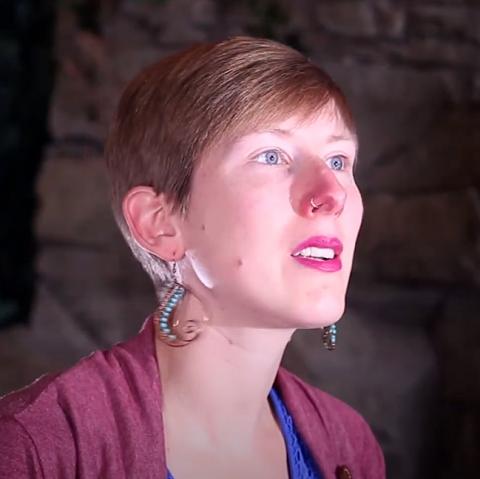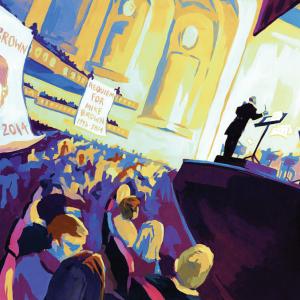
Korla Masters is interim pastor at Augustana Lutheran Church in Minneapolis.
Posts By This Author
Which Side Are You On, Friends?
IN FALL 2014, the St. Louis Symphony Orchestra performed Brahms’ Requiem on a Saturday evening two months after the murder of Michael Brown Jr., at a concert hall about 10 miles from Canfield Green, where Brown was killed and his adolescent body left out in the Missouri August sun for four and a half hours.
That summer and fall, people in the city and county of St. Louis lived in the tension of waiting — we were waiting for a grand jury to make a decision. Not a verdict about the officer’s guilt: The grand jury was tasked with deciding whether this murder was even a murder at all — whether anything happened on Aug. 9 that could even be considered maybe a crime. Maybe worth investigating. Or whether it was just a regular day’s work.
As intermission was ending and folks were back in their seats, just as the orchestra was regathered and the conductor was raising his baton, a small group of ticketholders in the audience stood up and sang. In singing, they asked the audience, made up largely of people who could choose whether or not they were impacted by the grand jury’s decision that loomed over the city like the shadow of death, to make a decision of their own. They stood up, one by one, and joined their voices in an old labor song: “Which side are you on, friend, which side are you on?” they sang. “Justice for Mike Brown is justice for us all. Which side are you on, friend, which side are you on?” They hung banners made of bedsheets over the balcony; one that echoed the piece being performed that evening was painted: “Requiem for Mike Brown, 1996-2014.”
These protesters brought this question — this disruption — into a space that could’ve kept it to business as usual. They sang the two refrains in repetition, almost like a Taizé chant, for several minutes, then they left the hall together, chanting a chant that at the time was still brand-new to most Americans: Black Lives Matter.
The disrupters left to a mix of silence and applause from the audience and the musicians. The concert continued, but the question hung in the air. It’s the same question that hangs in the air of many of Jesus’ disciple-calling stories, and it’s certainly the question that pervades Matthew’s telling of Jesus’ good news.
Behold, The Dreamer Cometh
A few weeks after the October 2002 plane crash that killed Sen. Paul Wellstone, his wife, Sheila, their daughter, Marcia, and five others, a Lutheran confirmation class visiting D.C. from Minnesota decided to stop by Wellstone’s office to pay their respects. As the group went through security at the Senate office building, one of the students—who had worked on the senator’s re-election campaign and was still wearing a Wellstone button—set off the metal detector. The officer took her to the side to wand her. As he was checking her, the guard said, “Not one other senator in this place knows my name; Paul Wellstone knew my kid’s name.” He and the student hugged each other, and both started weeping.
Paul Wellstone touched people’s lives in profound ways, mostly because he genuinely sought to live a life of integrity, in both public and personal matters. He once advised, “Never separate the life you live from the words you speak,” and those who knew him best said he honestly tried to follow that advice. (A Midwest political observer said the Right never knew what to do with Wellstone, because he lived “conservative values” at home while working for progressive change in the public sphere.)
Wellstone’s political career began when, as a political science professor at Minnesota’s Carleton College, he started working with farmers to block electric lines forcibly run through their farms—and he continued to organize and agitate on behalf of regular people for the rest of his days.
Bob Hulteen, a longtime Minneapolis-based activist (and a former Sojourners editor), said that Wellstone respected people more deeply than “any politician, or church leader, I’ve ever met—and, maybe most important, he didn’t take himself too seriously.” But Wellstone never underestimated the seriousness of his work for a better world, which is why, a decade after his passing, we asked several people who have been touched by his life in various ways to offer their thoughts on the legacy of a man who continues to offer a model of inspiration, integrity, and hope—attributes that are profoundly needed, in this and any election season.
—The Editors
A Farm Grows in Motown
The city of Detroit has several thousand vacant houses, but Darryl Howard has at least as many worms. Howard is an intern with Earthworks Urban Farm, a program of the Capuchin Soup Kitchen on Detroit’s East Side. He dreams of running a small business that supplies worms to farms that dot the city landscape.
As Howard and his colleagues (invertebrate and vertebrate alike) know, worms work with materials that, from the outside, appear spent—and surprise us by producing rich, healthy soil. As he digs his hands into the dirt, still in the phase between food scraps and soil, a smile breaks across Howard’s face. “This is how I feed myself, my family, my community, and the world.”
Detroiters often use the phoenix rising from the ashes as a metaphor for the city’s resilience; in its 300-year history, Detroit has gone through several periods of bad times and has come back each time. Yet worms might be just as apt a symbol this time around.
Detroit could come very close to feeding itself. According to the Detroit Food Policy Council, farming less than half of the vacant publicly held land in the city could yield three-quarters of the vegetables and almost half of the fruit consumed by Detroit residents. In a city that bleeds money when buying food, that could be enormously stabilizing.
Furthermore, the economic impact is far from the only benefit. There is cultural and social power in growing food for your community.
